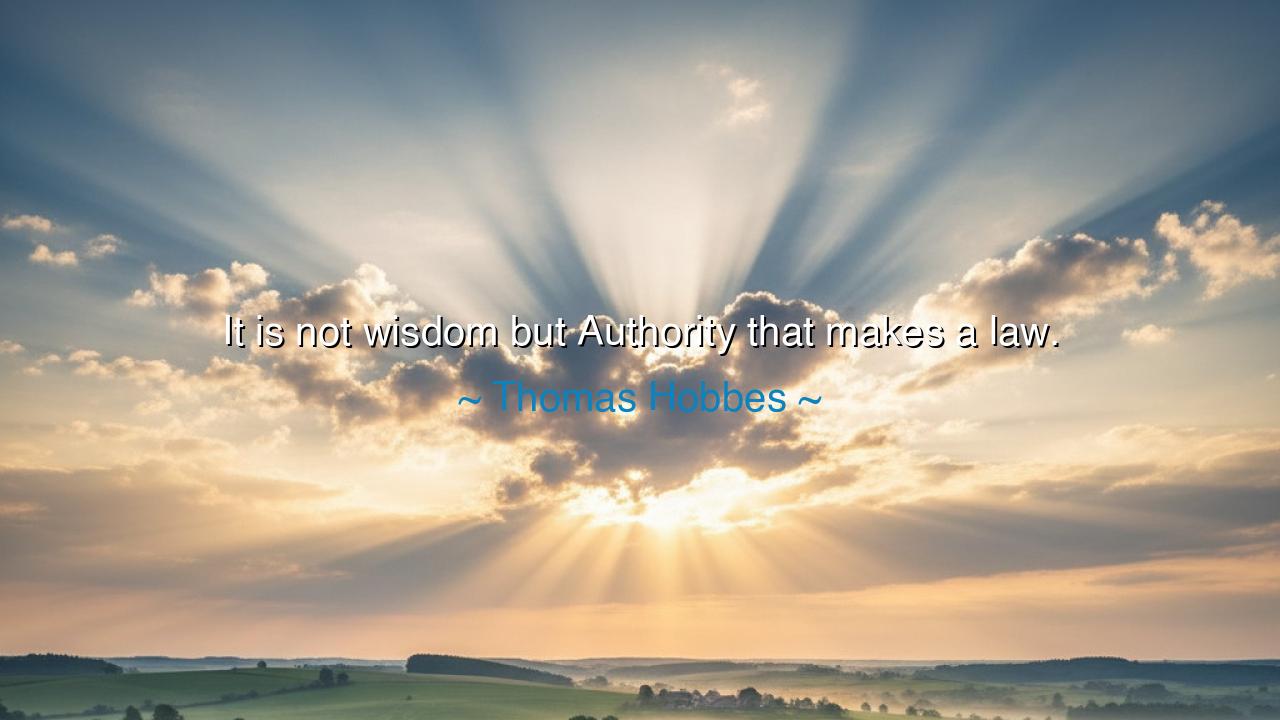
It is not wisdom but Authority that makes a law.






Thomas Hobbes, the stern philosopher of order, declared with cutting clarity: “It is not wisdom but Authority that makes a law.” In this saying, he revealed a truth that echoes through every age: that the making of laws is not always the fruit of reason or virtue, but of power. His words are not celebration, but recognition. For in the world of men, justice may be sought in wisdom, but it is authority—the hand that wields command—that gives law its force and binding power.
The meaning of this declaration lies in the nature of human society. Hobbes, writing in the shadow of war and chaos, understood that laws are not kept because they are wise, but because there is authority to enforce them. A rule, however just, remains a suggestion without the power to uphold it. Thus Hobbes reminds us of a hard truth: that order rests not on ideals alone, but on structures of enforcement, on rulers, courts, and governments that wield strength. Without authority, wisdom is but a whisper in the storm.
The origin of this thought can be traced to Hobbes’s great work, Leviathan, written during the English Civil War. In that age, kings clashed with parliaments, and the land was drenched in blood. Hobbes, seeing the violence of men left unchecked, argued that peace required a sovereign with power absolute—the authority to make laws and enforce them. For to him, without such authority, even the wisest laws would collapse, ignored by men who place their passions above reason. His words arise from lived chaos, where he saw clearly that philosophy alone could not restrain the sword.
History confirms his insight. Consider the fate of the League of Nations after the First World War. Founded upon noble ideals and crafted with wisdom, it sought to preserve peace among nations. Yet it lacked true authority; it had no army to enforce its decrees, no sovereign power to ensure obedience. Thus, when aggression rose, the League faltered, its wisdom impotent before the will of the strong. Only later, with the creation of the United Nations backed by enforcement mechanisms, did the world grasp anew Hobbes’s grim truth: that authority gives law its teeth.
Yet Hobbes’s words also carry a deeply emotional weight, for they remind us of the tension between justice and power. To say that law is born of authority is to confront the reality that not all laws are wise, not all decrees are just. Tyrants, too, possess authority, and their laws may be chains rather than shields. The heart trembles before this recognition: that the letter of the law may oppress as easily as it protects, depending not on wisdom but on who holds command. Hobbes’s words cut, for they reveal the frailty of justice in the hands of power.
To future generations, this saying offers both warning and counsel. The warning is this: do not mistake law for wisdom, nor assume that because something is decreed, it is just. The counsel is this: if laws must rest upon authority, then let us labor to place authority in the hands of the wise, the just, and the merciful. For though power may make the law, it is the spirit of wisdom within the powerful that determines whether law becomes a shield of the weak or a sword of oppression.
The lesson is plain: do not trust blindly in authority, but question it; do not assume that wisdom rules simply because law exists. In daily life, this means holding leaders accountable, seeking truth even when it conflicts with power, and remembering that justice requires more than obedience—it requires vigilance. If you are given authority, wield it with humility, guided by wisdom, so that your laws uplift rather than destroy.
Thus Hobbes’s words endure: “It is not wisdom but Authority that makes a law.” Let this truth be remembered not as despair, but as caution. Authority will always shape law; but it is for the people, and for future generations, to demand that authority be tempered by wisdom. Only then can laws be both strong and just, binding by power yet enlightened by truth.






AAdministratorAdministrator
Welcome, honored guests. Please leave a comment, we will respond soon